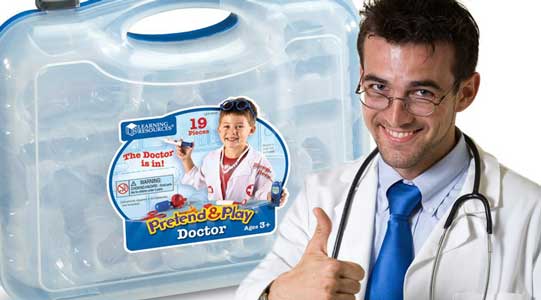Are you playing doctor by diagnosing your injuries after a car accident. This is known as self-diagnosing an injury. This may seem like a great idea. However, in most cases, this isn’t really recommended and you should not consider doing it.
There are different reasons why you should go to a doctor. Rather than trying to diagnose your own injuries. This might not be the best thing, and you might have a more serious injury than you might think. If this is something that you have done before, then this next piece of information is to show you how dangerous it can be to diagnose yourself after a car accident.
Table of contents
Know that there is a difference between observing your injuries after an accident and diagnosing your own injuries!
The first thing that you should know is that there is a huge difference in observing your injuries after a car accident and diagnosing your own injuries. Normally the first thing that you should do after an accident is to observe your injuries to see if you are seriously injured or not. If you don’t feel like you have broken bones or excessive bleeding, you can exit the vehicle and find out the extent of the injuries of the people in the other vehicle. Make sure you go to the doctor to check that you really don’t have any serious injuries.
Reasons why people self-diagnose injuries
You may decide that you don’t have any serious injuries, and you don’t need to see a doctor. This is dangerous because you can’t see if there are any internal injuries that might be serious. Those injuries may have serious consequences. Here are a few reasons with people diagnose their own injury.
Convenience
Seeking medical attention can be time-consuming and expensive. Some individuals may opt for self-diagnosis as a quicker and more convenient alternative.
Have no money.
Many people have no money or means to see a doctor. In most personal injury cases, there medical bills would be paid for.
Have no Health Insurance
Many Americans still have no health insurance. This may stop them from seeing a doctor. However, in most personal injury cases, health insurance is not used.
Avoidance of Medical System
Negative experiences with healthcare providers or distrust of the medical system may lead people to self-diagnose rather than seek professional help.
Privacy
Concerns about privacy or embarrassment regarding certain symptoms or conditions may discourage individuals from consulting healthcare professionals, prompting them to self-diagnose in the comfort of their own home.
Fear of Diagnosis
Some people may fear a diagnosis from a healthcare professional and prefer to avoid confirmation of a potentially serious condition. Self-diagnosis allows them to maintain a sense of control and denial.
Access Barriers
Inadequate access to healthcare services, such as limited availability of healthcare providers or lack of insurance coverage, may push individuals to self-diagnose as a temporary solution.
Empowerment
The abundance of health information available online empowers individuals to take charge of their health and make informed decisions about their well-being. Self-diagnosis can be seen as a proactive step in this regard.
Previous Experience
Individuals with prior experience managing similar symptoms or injuries may feel confident in their ability to self-diagnose based on their past knowledge and outcomes.
Misinterpretation of Symptoms
Some people may misinterpret their symptoms or underestimate the seriousness of their condition, leading them to believe that self-diagnosis is sufficient without professional evaluation.
Stigma
Stigmatization associated with certain health conditions, such as mental health disorders or sexually transmitted infections, may discourage individuals from seeking professional diagnosis and treatment.
Cultural or Religious Beliefs
Cultural or religious beliefs may influence individuals’ perceptions of illness and healthcare practices. Some may prefer traditional or alternative remedies over conventional medical treatment, prompting them to self-diagnose within their cultural or religious framework.
The top two, they have no money, its inconvenient or if you are like me, you just don’t want to go see a doctor. My wife must literally make me go see a doctor. I just don’t want to spend the time waiting in a room for the doctor to see me. However, if you have been in a car accident, it would be wise to go ahead and see a doctor. If you are concerned about money, you shouldn’t be. Your health should be your number one priority no matter the cost.
Obvious Signs that you may go to the ER after a car wreck.
There are some obvious signs that you should go to the emergency rooms for immediate medical care. This is when there are any visible injuries like blood, broken bones and if you have lost consciousness after the accident.
- Broken Bones
- Pain around your stomach area (seatbelt)
- Signs of bleeding
- Stiffness in neck and or back
- Head pain!
- You have lost Consciousness.
- Children and infants should go to the ER no matter what you think of their condition
If you have any stiffness in your back or neck, this is also serious, and you need to go to the ER immediately. These are injuries that can’t wait for treatment. The longer you wait the more serious the injuries might become.
If the accident was a serious accident, and people were seriously injured. You may not have a choice; the ambulance is going to take you to the ER. There are not many people that are walking away from an accident scene when other people were seriously injured.
The dangers of delayed injuries
One of the other reasons why self-diagnosed injuries can be serious or even fatal is because of delayed injuries. They think that only injuries that you can feel right after an accident are serious and that if you feel something is wrong a couple of days afterward, it isn’t something serious.
However, some injuries are visible days after the accident. This includes internal bleeding and head injuries. Delayed injuries should always be treated as serious and you need to make sure that you are going to see an accident doctor right away. The longer you are waiting, the more serious the injury might become. And don’t even think about diagnosing these injuries yourself. Any delayed injuries require immediate medical care.
When should you see an accident doctor
The question that many people are asking is when you should really see an accident doctor and when is it okay not to go to one. When you are in any form of a car accident, it is safer to see an accident doctor make sure that you and your passengers aren’t injured. You should see the doctor as soon as possible so that they can diagnose any injuries and serious internal injuries as soon as possible.
The only time that you don’t need to see your accident doctor, is if the emergency services took you to the ER. After the ER visit you need to schedule an appt with a doctor who treats car accident injuries.
A chiropractor can be also a great choice
Many people consider going to a chiropractor after a car accident. This is because some of them specialize in accident injuries. However, they are more ideal for mild injuries like back and neck injuries and any muscle injuries. The more serious injuries are going to be referred to a specialist for treatment.
They may effectively treat.
- Back Pain
- Headaches
- Leg or arm pain
- Neck pain
- Numbness or tingling sensation
- Pain radiating down arms or legs
- Shoulder pain
- Whiplash
Chiropractic care has been shown to be effective in treating people who have been injured in car accidents. Many car accident injuries are soft tissue injuries. Chiropractors are trained in nothing but soft tissue injuries. But not all chiropractors can treat, and document car accident injuries.
Some chiropractors are geared more towards wellness or sports related injuries. In some areas you will find chiropractors who do nothing but auto accident care. Most doctors listed on accident doctor are chiropractors. However, in most areas we have Medical, Orthopedic, and Pain management.
Why you shouldn’t diagnose your own injuries.
There are a couple of mistakes that people make when they are trying to diagnose their own injuries. Mistakes can mean that your injuries become more serious and even life-threatening. These are some of the reason you should not self-diagnose your injury
Inaccuracy
Laypersons often lack the medical expertise to accurately diagnose injuries. Symptoms can overlap between different conditions, leading to misinterpretation.
Delayed Treatment
Incorrect self-diagnosis can delay proper treatment, allowing the injury to worsen over time. Timely intervention is crucial for effective recovery and delaying it can cause the problem to get worse.
Complications
Some injuries may appear minor initially but can develop complications if not properly diagnosed and treated. Ignoring symptoms or mistaking them for something else can lead to more serious health issues.
Masking Symptoms
Self-diagnosis may lead individuals to focus on treating symptoms rather than addressing the underlying cause. This can provide temporary relief but fails to address the root problem, leading to persistent issues.
Overlooking Serious Conditions
Certain injuries, such as fractures or internal organ damage, require professional evaluation and imaging for accurate diagnosis. Failure to recognize these serious conditions through self-diagnosis can have severe consequences.
Risk of Mismanagement
Incorrect self-diagnosis may result in inappropriate self-treatment, such as taking the wrong medication or applying improper first aid techniques. This can exacerbate the injury or cause harm.
Legal and Insurance Implications
In some cases, self-diagnosis may not be recognized by insurance companies or legal entities, potentially affecting compensation claims or coverage for medical expenses.
Psychological Impact
Self-diagnosis based on internet research or anecdotal evidence can lead to unnecessary anxiety, hypochondria, or health-related obsessions. It may also interfere with trust in healthcare professionals and delay seeking necessary medical advice.
Professional Expertise
Healthcare professionals have the training and experience to accurately diagnose injuries, considering various factors like medical history, physical examination, and diagnostic tests. Relying on self-diagnosis overlooks this expertise.
Complexity of Diagnosis:
Some injuries have subtle or complex presentations that require specialized knowledge to identify. Attempting to self-diagnose such conditions without proper medical training is often futile and can lead to frustration and further complications.
Specialized equipment
Self-diagnosing your injuries after a car accident may not be in your best interest. And, because of delayed injuries, you might not even realize that you are injured at all.
It is important to make sure that you aren’t seriously injured right after the accident, but then you should still go see an accident doctor for a final diagnosis to ensure that you are not injured. Some people are self-diagnosing their accident injuries and not seeing the right doctor as soon as possible.



